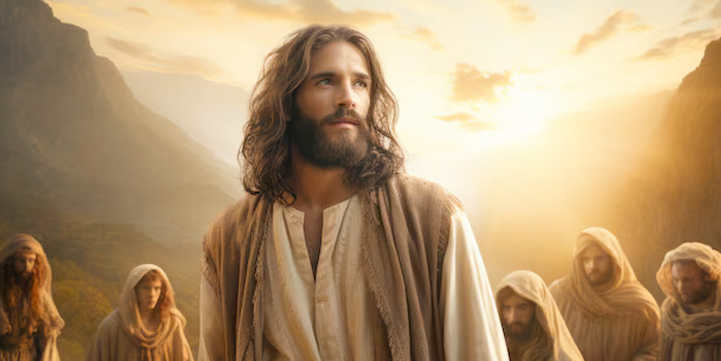

Unraveling the mystery of the Cross.
January 26, 2025
Created by: Isabel Orozco, theologian and visual artist; director of La Casa del Artesano
@lacasadelartesano_medellin

The question about the reason behind Christ's death has resonated throughout the centuries. The common answer, "Christ died on the cross for the forgiveness of our sins," while not incorrect, often raises more questions than answers. Why death as an exchange for sins? Are we dealing with a bloodthirsty God who demands a sacrifice to grant forgiveness? Couldn't God have chosen another way to solve the problem of human sin?
To gain a deeper understanding, it is essential to explore the historical and cultural context of the Old Testament covenants, a crucial framework for understanding the meaning of Christ's death.
Covenants in the Old Testament: A Language of Commitment
In the time of the patriarchs, the making of pacts was a common practice. Archaeological finds, such as the so-called vassal pacts between emperors and lesser kings, confirm the significance of these agreements. A "covenant" (in Hebrew, בְּרִית, "berit") was not simply a contract, but a solemn agreement establishing a binding relationship between the parties involved.
The expression "cutting a covenant" refers to the ancient rite of sacrificing an animal and dividing it into pieces. This ritual, documented in texts from Mari, the Alalak tablets, and the Old Testament, symbolized the seriousness and consequences of the pact. Part of the animal was burned in honor of the deity, and another part was consumed in a meal to celebrate the agreement.
Every pact involved obligations and promises. Its typical structure included:
- Preamble or introduction: Presentation of the great king with his titles and attributes.
- Historical prologue: Account of the great king's exploits in favor of his vassal and his people.
- Stipulations of the treaty: Prohibitions on relations with other nations and demands for loyalty to the great king.
- List of witnesses: Invocation of gods, heaven, earth and other elements as witnesses to the agreement.
- Curses and blessings: Consequences for breaking or fulfilling the pact.
- Annual renewal: Presentation of the vassal before the great king to renew the pact.
- Deposit of the text of the treaty: Temple storage and occasional reading.
These elements resonate in the covenants of the Old Testament, where we find examples such as the covenant between the Israelites and the Gibeonites (Joshua 9-10).
Human covenants and the divine covenant
In the Bible, it is crucial to distinguish between covenants made between people (συνθήκη, "syntheke" in Greek) and covenants that God establishes with chosen individuals (διαθήκη, "diatheke" in Greek), such as the covenants with Noah and Abraham.
Covenants in the Old Testament were often accompanied by an oath, where the terms "covenant" and "oath" were used almost interchangeably. The oath formula included an invocation of a curse upon oneself in case of breach: "God do so to me, and more also, if…" (1 Kings 2:23–24; 19:2; 20:10; 2 Samuel 3:35). Jeremiah 34:18 shows that God announced this punishment for covenant breakers.
God, in his wisdom, adopted the covenantal form of the Ancient Near East to communicate with his people in a familiar language and establish alliances with them.
The covenant with Abraham and the covenant of Sinai
Genesis 15 describes a covenant rite in which God asks Abraham to bring animals, cut them in half, and place the parts in rows (Genesis 15:8-10). A flame of fire, a symbol of the divine presence, passes between the animals (Genesis 15:17). In this unilateral covenant, God is the one who commits, making promises to Abraham concerning his descendants and the land (Genesis 15:18-21).
The Sinai Covenant, established with Israel after their liberation from Egypt, is a bilateral covenant, with both parties making commitments. God promises to be Israel's God, to protect them and make them his people, while the people agree to obey God's commandments. Exodus 19–24 details this covenant, including the theophany, the Ten Commandments, and the conditions of the covenant.
Exodus 24 describes the celebration of the covenant, where the people promise, “We will do everything the Lord has commanded” (Exodus 24:3). Sacrifices are offered, and the blood of animals is divided, some sprinkled on the altar (Exodus 24:5-6). Moses reads the stipulations, and the people respond, “We will do everything the Lord has commanded. We will obey” (Exodus 24:7). Moses sprinkles the other part of the blood on the people, saying, “This blood confirms the covenant the Lord has made with you in giving you these instructions” (Exodus 24:8).
This bilateral covenant carried the death penalty for noncompliance. However, despite the grave consequences, God assures us that He will not abandon the covenant (Leviticus 26:44-45). The incident of the golden calf in Exodus 32, where Israel worships an idol, illustrates divine justice and the consequences of noncompliance. God commands the Levites to kill the unfaithful, and about 3,000 people die (Exodus 32:27-28).
The sacrificial system and divine mercy
Foreseeing Israel's continued disobedience, God instituted the sacrificial system in the Tabernacle (Leviticus 1–7) to atone for guilt and prevent the continued death of transgressors. Divine mercy is manifested in the preservation of the covenant and the provision of a means for atonement. Just as vassals renewed their treaties annually, Israel had an annual Day of Atonement with multiple sacrifices to cleanse guilt and renew the covenant (Leviticus 16). Exodus 34 describes a covenant renewal ceremony following the incident of the golden calf.
In this renewal, God, though merciful, warns: “The Lord! The God of compassion and mercy! I am slow to anger, and I am full of unfailing love and faithfulness. I pour out unfailing love to a thousand generations, and I forgive iniquity, rebellion, and sin. Yet I do not acquit the guilty, but I extend the sins of the fathers to their children and their grandchildren; the whole family is affected, even the children of the third and fourth generation” (Exodus 34:6-7).
The universal covenant in Christ
Although the Sinai covenant was established with Israel, its scope is universal. Humanity, heir to the sinful nature of Adam and Eve, is also subject to its consequences. God, in calling Abraham, extends the promises to all humanity: "All the families of the earth will be blessed through you" (Genesis 12:2).
The Sinai covenant, therefore, encompasses all humanity. Just as Israel violated the covenant's stipulations, so too have non-Jews, deserving death as punishment for sin. Romans 6:23 states: "For the wages of sin is death," echoing the judgment in Eden: "If you eat of its fruit, you will surely die" (Genesis 2:17).
Jesus, in his love and sacrifice, chooses to die on the cross to pay humanity's debt for disobedience to God's commandments. His cry from the cross to God and humanity is: "Father, I know they have broken their promises. I know they must pay with their death, to be cut down like the beast of the covenant. But I don't want them to die. I will die in their place."
The inclusion of non-Jews in the Sinai covenant is not to condemn them, but rather to grant them access to the benefits of the new covenant in Jesus, where believers find complete salvation. God, knowing our sinful nature, embraces us with his salvation by including us in the blessings of the Abrahamic covenant and the Sinai covenant, which reveals to us our need for a Savior.
The New Covenant in the blood of Christ
During the Last Supper, Jesus dramatizes his own death with the bread and wine. As he breaks the bread, he says, "Take, eat; this is my body, which is broken for you" (1 Corinthians 11:24), alluding to the sacrifice of animals in covenant ceremonies. With the wine, he affirms, "This cup is the new covenant in my blood" (1 Corinthians 11:25).
The broken body of Christ has a double meaning in relation to the covenant:
- Payment with death for our failure to comply with the Sinai covenant.
- A new covenant through which human beings can "fulfill" their obligations to God through their sacrifice.
Jesus is the perfect substitute for sacrificial animals. His broken body on the cross is presented by the Father as the ritual in which he commits his word to a covenant. This covenant is perfect and needs no renewal, since the sacrifice was of someone who had never sinned. Romans 6:23 concludes: "For the wages of sin is death, but the gift of God is eternal life through Jesus Christ our Lord."
Hebrews 9:14-15 masterfully summarizes the great King's accomplishment on behalf of his people and his subjects: "Christ offered himself to God as the perfect sacrifice for our sins. Therefore he is the mediator of a new covenant between God and mankind, so that all who are called may receive the eternal inheritance promised to them. For Christ died to free them from the penalty of the sins they committed under the first covenant."
Conclusion
The great King has spoken; his feat on the cross has won us over to live an eternity at his side. Heaven and earth bear witness to his love and sacrifice. With these assurances, we become his loyal vassals, grateful for the grace and salvation offered in Christ.
Reflection Questions:
- How does our understanding of the Old Testament covenants influence our appreciation of Christ's sacrifice?
- What is the meaning of the "new covenant" in the blood of Christ for our life and hope?
- How can we live as “loyal vassals” of the great King in response to his love and sacrifice?
When Jesus was a refugee…

The Divine Exodus: When God became a migrant…

Access the course Why Jesus? free with online mentors, from anywhere and in total anonymity

Register in a safe way
anonymous.

Enter your course at no cost.

Interact with our mentors.
Testimonials
“I think it is a course with very valuable and helpful information for those of us who often suffer from anxiety in moments of insecurity and fear.”
“The course is very good, it gives us the best way to overcome moments of anxiety, since even knowing the Word it happens to us that we are vulnerable, we feel fear and we get blocked, we get confused and we do not go first of all to our Lord and God Almighty".
“Excellent course. Addressing the issue of anxiety from the love and protection of God fills me with confidence, knowing that He does not abandon me and that the path He has prepared for me is beautiful and perfect.”

Student: Martha Rodríguez
Puerto Rico

Student: Norma González
USA

Student: Carlos Olarte
Colombia





0 Comments